Key Takeaways:
- Psychiatric nurses specialize in treating patients with mental health issues like anxiety, mood disorders, and substance abuse.
- To become a psychiatric nurse, you must first be a Registered Nurse (RN), requiring a degree and passing the NCLEX-RN.
- Advanced psychiatric nursing requires additional certification and experience, potentially leading to a role as a Nurse Practitioner (APRN).
- Psychiatric nurses work in various settings, including hospitals, outpatient facilities, and schools, and collaborate with a wide range of healthcare professionals.
Nursing is an endlessly fulfilling career. Nurses care for patients in many ways. They work alongside physicians, nurses who work in disparate specialties, and other medical staff to treat patients, communicate with families, and document medical records and progress, along with many other duties.
After completing educational programs, training requirements, and receiving certification, nurses can enter a variety of roles in the field. There are many different pathways and tracks within nursing, but one thing remains constant: nurses are very demanded in the current job market. Predictions on employment indicate this demand will only grow in the coming years. To sweeten the pot, nurses are often paid significantly more than the average American worker. They have many opportunities to enhance their credentials and earnings throughout their education and career.
If you want a career in nursing or are looking to switch positions within the field, we’re here to help. At Best Health Degrees, we’ve worked hard to provide you with a litany of resources you can use to help you gain new credentials and reach new roles in nursing and the medical field overall. Our work includes exploring positions, ranking available degree programs, showing you what you’ll need to do to qualify for coveted jobs, and much more.
One thing you need to understand — especially if you’re starting to consider a role in nursing — is how difficult this field is. Nurses work long hours. They’re often on their feet and routinely required to lift heavy loads, including physically assisting patients. They need to be comfortable dealing with traumatic injuries and medical conditions. Nurses also help patients take care of themselves, including bathing and using the bathroom.
Achieving a role in nursing will require daunting work in the form of training, education, exams, all leading to applying and earning certifications in the field. If you want to be successful as a nurse, you’ll need a dogged pursuit of new skills and training. You can’t sit on your laurels here if you want to be successful.
Nursing traces its roots to well over a millennia ago. From the Roman Empire, through the Middle Ages, past the Industrial Revolution, nursing has evolved alongside medicine and society to become one of the most entrenched, indispensable sectors of the American and global economy. In 1860, the first School of Nursing was opened in London. Since then nursing education has been formalized, regimented, and divided into versatile, specific roles that allow candidates to take on vastly different responsibilities and heal patients in many different ways.
In this guide, we’ll explore one role in the field: Psychiatric Nursing. We’ll look at what the role means and what psychiatric nurses do. We’ll explore how you become a psychiatric nurse, how you find a program that suits your needs and goals, and how we can help you decide whether and where to do so. Finally, we’ll delve into earnings and employment in the field.
Let’s start with the basic foundation of psychiatric nursing:
What is a Psychiatric Nurse?
Psychiatric Nurses, also referred to as Behavioral Health Nurses, specialize in treating patients with substance abuse issues, mental illnesses, addictions, dementia, and eating disorders, among other problems. While all nurses provide emotional support, psychiatric nurses must do far more of it. They work with patients, their families, medical staff, case managers, social workers, and other professionals. Psychiatric Nurses assess issues, create safe environments, treat committed patients and help discharge patients when they’ve been deemed ready to leave psychiatric facilities (when appropriate).
Some of the environments you can expect to find psychiatric nurses in include:
- Hospitals
- Prisons
- Outpatient mental health organizations
- Psychiatric hospitals
- Home healthcare organizations
- Schools helping people with emotional and mental issues
What do Psychiatric Nurses Do?
The American Psychiatric Nurses Association (APNA) notes that psychiatric nurses specialize in mental health assessments, crisis intervention, therapy and medication, and assisting patients. Psychiatric nurses work diligently with patients, their families, and other medical professionals to help patients deal with their mental illnesses and live meaningful, highly-functioning, and productive lives.
When a psychiatric nurse meets a patient, they’ll begin by interviewing and assessing them to discover their symptoms, history, auxiliary issues, daily schedule, and habits. Their approach will differ for different conditions, including:
- Anxiety Disorders: which can manifest as phobias and panic attacks
- Mood Disorders: like depression and bipolar disorder
- Personality Disorders: like borderline personality disorder, histrionic disorder, and others
- Substance Abuse: like alcohol or drugs
- Habitual Behavior: think eating disorders, self-harm, etc.
- Dementia: issues like Alzheimer’s disease
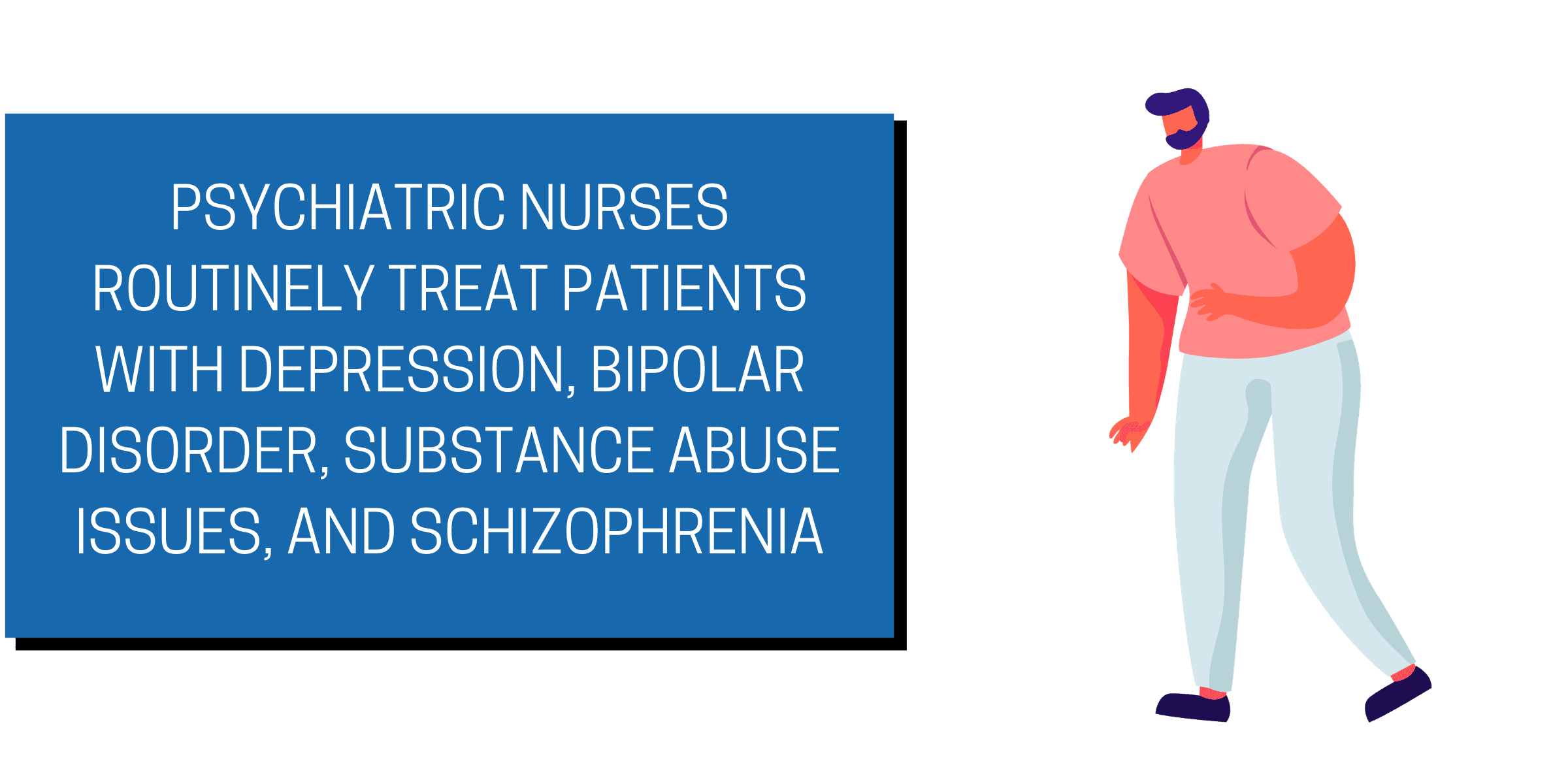
Psychiatric nurses collaborate with treatment teams to plan, create, and implement individualized patient plans. The goals of these plans are to care for patients, minimize harm, and maximize patient wellbeing and productivity. They counsel patients individually and sometimes in groups. They work with patients and families to educate about specific conditions. Sometimes psychiatric nurses help patients groom themselves, get dressed, and take medications.
Another related role is working as a Mental Health Nurse. Becoming a Psychiatric Nurse requires more education, training, and a higher certification while working as a Mental Health Nurse requires less training and a lower accreditation in the nursing hierarchy.
Speaking of which, let’s look at what it takes to become a Psychiatric Nurse:
How Do You Become a Psychiatric Nurse?
Psychiatric Nurses are first and foremost Registered Nurses (RNs). To become an RN, you’ll need either an associate or a bachelor’s degree in nursing. This will take two to four years to complete. While there are some paths to becoming an RN through an associate in nursing degrees, it behooves us to suggest earning a bachelor’s degree in a four-year program. Graduates of these programs will have an easier time earning certification, getting hired, and will likely be paid more.
After passing a degree program that prepares you to become an RN, you’ll need to pass the National Council Licensure Exam (NCLEX-RN). This multiple-choice computer-based test features questions that fall under the five-step nursing process. The five steps are assessment, diagnosis, planning, implementation, and evaluation. There are at least 75 questions on the test, and as many as 265. This is because the test is computer-adaptive, meaning it recalibrates its content for the test taker to make sure questions aren’t too hard or too easy depending on their progress. There are also 15 experimental questions that don’t count against your score but are used to help exam administrators write future questions. You’ll have a total of 6 hours to complete the test.
The questions on the test are further broken down into the following categories:
- Questions about Safe and Effective Care Environments
- Questions about Health Promotion and Maintenance
- Questions about Psychosocial Integrity
- Questions about Physiological Integrity
After passing this test and applying for RN licensure, you’ll need to take further steps to become certified as a Psychiatric Nurse. Psychiatric Nurses need to earn the PMHNP-BC certification through the American Nurses Credentialing Center (ACNN). This means holding an active RN license, having two years of clinical experience, 2,000 hours working in a psychiatric nursing practice, and 30 hours of continuing education in psychiatric nursing. The certification lasts five years, at which point you’ll need to seek renewal.
What are the Available Psychiatric Nursing Degree Programs?
There are RNs that work in Psychiatric Nursing, and advanced nurses that are certified as Psychiatric Nurses and Psychiatric Nurse Practitioners.
To reach higher levels in the field, you’ll need a Master of Science in Nursing degree. Psychiatric nurse practitioners are classified as Advanced Practice Registered Nurses (APRNs), holding a graduate degree in psychiatric-mental health nursing.
As previously mentioned, you can become a Mental Health Nurse after completing only an associate degree in nursing and gaining licensure as a Licensed Practical Nurse (LPN).
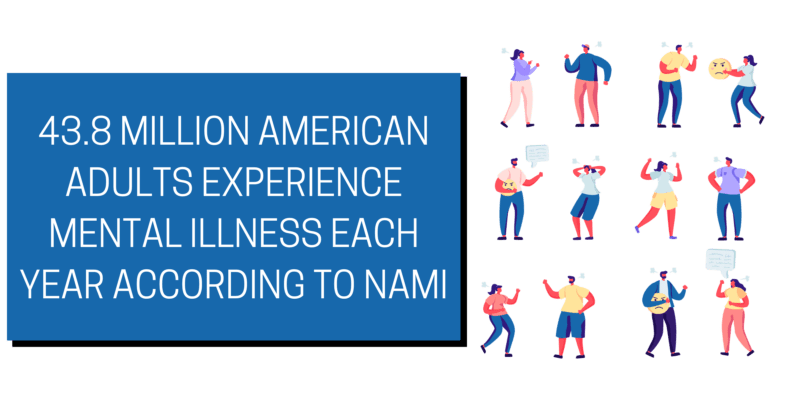
What Do You Study in Psychiatric Nursing Programs?
The different levels of licensure in mental health nursing offer diverse job opportunities, pay, and responsibilities. No matter which path you opt for, you’ll likely study some of the same topics. These will often include:
- Nursing Concepts and Ethics
- Nursing Theory in Psychiatric-Mental Health
- Community Nursing
- Nursing Across Cultures
- Leadership and Management for Nurses
- Advanced Practice of Psychiatric Nursing
Some of these courses would be taken at the graduate level, while some are completed in undergraduate degrees.
This is a complex field. Breaking down your options can help you decide what the best path in it for you is. To that end:
Ask Yourself and Consider the Following About Your Psychiatric Nursing Education and Career
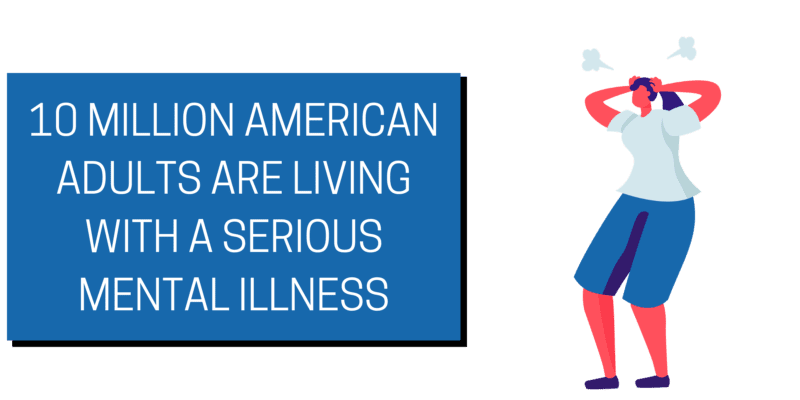
- What do you want to do in your education and career in nursing?
- What level of nursing education and experience have you reached so far?
- What certifications and licenses in nursing have you achieved?
- Do you want to be an LPN working in mental health counseling, an RN working in psychiatric nursing, or an APRN who is qualified as a Psychiatric Nurse or Psychiatric Nurse Practitioner?
- Depending on your goal, you’ll need either an associate’s degree in nursing, a bachelor’s degree in nursing, or a master’s degree in nursing, along with the appropriate training, exam, supplementary clinical experience, and licensure. By deciding on a title and degree, you want to reach you can help simplify your pathway in nursing.
- If working in psychiatric nursing isn’t right for you, what would you like to do instead?
- What is your current educational and career experience in medicine or nursing, and what have you done so far that has prepared you to work in mental health?
- How long can you commit to a nursing degree? Think daily, weekly, and overall before graduating at the level you’ll need to reach for the position you want.
- Do you want to attend school part-time, full-time, online, on-campus, or in a hybrid of online and on-campus instruction?
- All nursing programs and licenses require you to do in-person work, but you can often do some of your coursework online, saving you time and money as you work towards your goals.
- Do you need to attend a program that allows you to work while you earn your degree? Many nursing programs are set up to facilitate working while studying. In many cases, programs require students to be working while earning their degrees.
- Where do you want to live and work during and after your training as a mental health or psychiatric nurse?
- Nurses are extremely demanded throughout the country, and nurses with specialties (like in mental health or psychiatric nursing) are especially demanded. Still, where you get your degree and do your clinical work can make a difference in job opportunities.
- Some states and areas pay higher than others, and some employ more nurses than others. Studying and training in a place with high employment and pay can boost your opportunities once you’re fully certified in the position of your choice.
- How will a specific program help you achieve your goals? How does it facilitate training and allow you to specialize in different areas of mental health or psychiatric nursing?
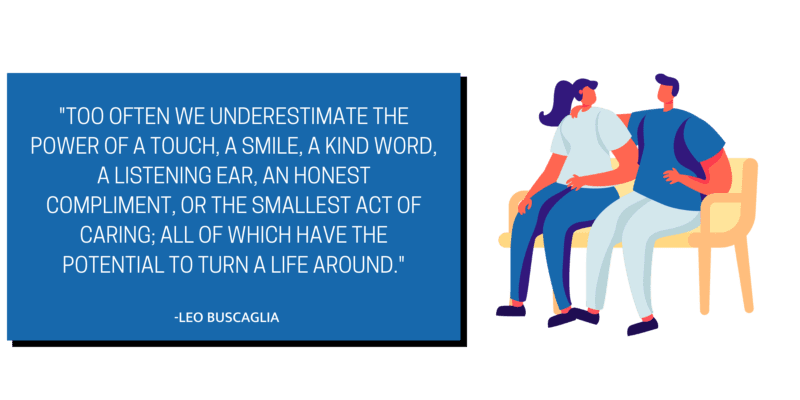
These are just some of the questions and considerations that should animate your decision-making process when pursuing a degree in psychiatric nursing or mental health nursing. Answering these questions for specific programs can help you whittle down your options and make choices that will fit in with your life, needs, and current responsibilities.
Now let’s inspect what we’ve done to help you in your nursing career:
How Can We Help You In Your Nursing Education and Career?
Here at Best Health Degrees, we’ve worked tirelessly to provide you content that can simplify and demystify your career options in nursing and medicine at large. We aim to define roles in the field, help you decide what roles are right for you, how to go about getting them, and clarify common misconceptions, among many other beneficial explanations and guides.
To accomplish these goals we’ve written guides like this one about specific pathways in nursing, broader resources, answered common questions, ranked degree programs, and much more.
If you find any school, organization, or other institution through our content that you think would be right for you and help you achieve your career goals, reach out to them. Communicating with professionals will enhance your chances of acceptance and understanding the intricacies of specific programs. By writing the support staff of a program, you can get more information, answers to questions you might have, and a better understanding of whether you qualify for the program you want to be in. You’ll also get answers to what you need to do if you don’t qualify, and figure out how to improve your chances of entry.
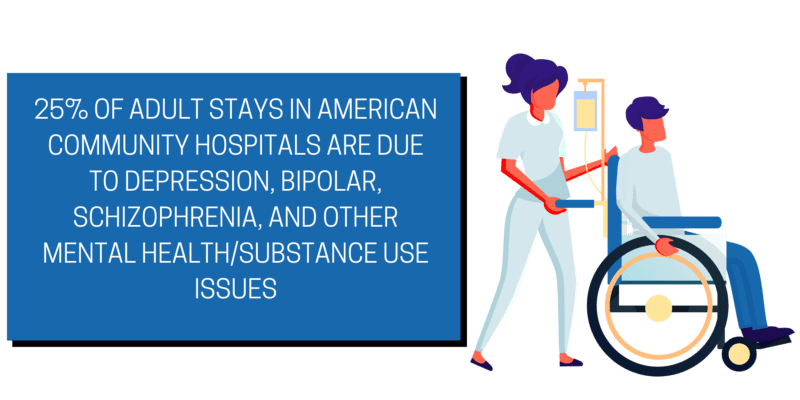
Let’s look at some of the content we’ve produced that relates to nursing degrees, and psychiatric nursing/mental health counseling specifically:
DEGREE RANKINGS
- 25 Best Master’s in Healthcare Administration
- 15 Best Online Master’s in Healthcare Administration
- 15 Best Online MSN Degree Programs
- 25 Online Master’s in Nursing and Healthcare Informatics
- 15 Best Master’s in Nursing and Healthcare Informatics
- 15 Best Online BSN Degree Programs
- 25 Best Traditional BSN Degree Programs
RESOURCES
- What Can I Do with a Bachelor’s in Nursing?
- What Can I Do with a Master’s of Science in Nursing?
- What Can I Do with a Master’s in Health Informatics?
- What Can I Do with a Master’s in Healthcare Administration?
ANSWERING COMMON QUESTIONS
- How Do You Become a Mental Health Counselor?
- How Do You Become a Psychiatrist?
- What Types of Nursing Degrees Can I Get?
- What is the Difference Between a Psychiatrist and a Psychologist?
- What is Socio-behavioral Studies in Healthcare?
- What is a Psychiatrist?
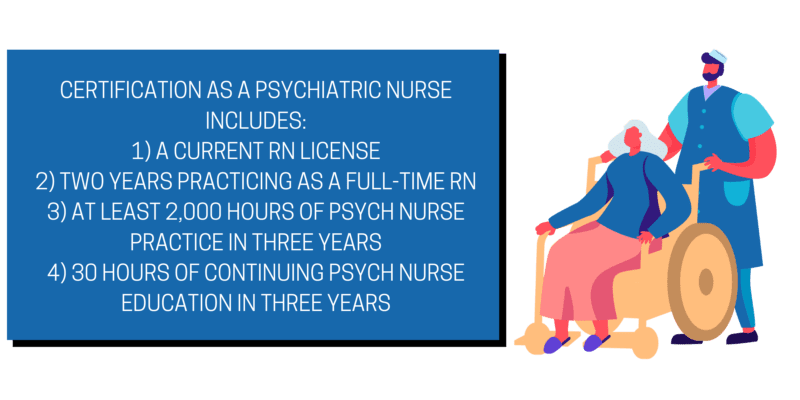
We frequently update our content, so be sure to come back and see what else we’ve written to help you in your mental health or psychiatric nursing career, among other pathways in nursing and medicine.
Before we conclude the guide, let’s look at the employment opportunities and earnings you can expect working as a nurse in mental health and psychiatry:
What Can You Expect to Earn as a Psychiatric Nurse or Mental Health Counselor?
There are several roles in this field, all with different pay and employment opportunities. We’ll go through a few of them. The United States Bureau of Labor Statistics was used to gather the following information unless otherwise noted. Their information more often refers to levels of certification like being an LPN, RN, or APRN.
The lowest level of working in mental health as a nurse is achieved after earning an LPN. BLS notes the following about LPN employment:
- In 2018, LPNS earned a median pay of $46,240 annually, or $22.23 per hour.
- There were 728,900 people working as LPNs in 2018.
- BLS predicts these roles will increase by 11% between 2018-28, meaning there will be 78,100 new jobs.
- As of May 2018, the lowest 10th percentile of LPNs made approximately $33,680 annually, while the the highest 10th percentile made approximately $62,160 each year.
To work in psychiatric nursing, you’ll need to be a licensed RN. Here’s some information about their employment:
- In 2018, RNs earned a median wage of $71,730 each year, or $34.48 per hour.
- In 2018 there were 3,059,800 practicing nurses.
- Nursing employment was expected to jump 12% between 2018-28. This would mean 371,500 new jobs in the field.
- Payscale found that Psychiatric Nurses (RNs) made between $50,084 and $87,344 depending on their skills and experience.
- Indeed found that the average base salary for psychiatric nurses was $50.39 per hour.
Where Do Psychiatric Nurses Earn the Most Money?
To be a psychiatric nurse, you’ll need to qualify as a Nurse Practitioner, or APRN:
- BLS found there were 179,650 people in these roles as of May 2018.
- The mean hourly wage for these roles was $52.90, and the mean annual wage was $110,030.
- The lowest 10th percentile of nurse practitioners made $78,300 annually, or $37.64 per hour, while the top 10th percentile made $72.27 per hour or $150,320 annually.
- Monster.com found the average salary for a psychiatric nurse practitioner was $119,000.
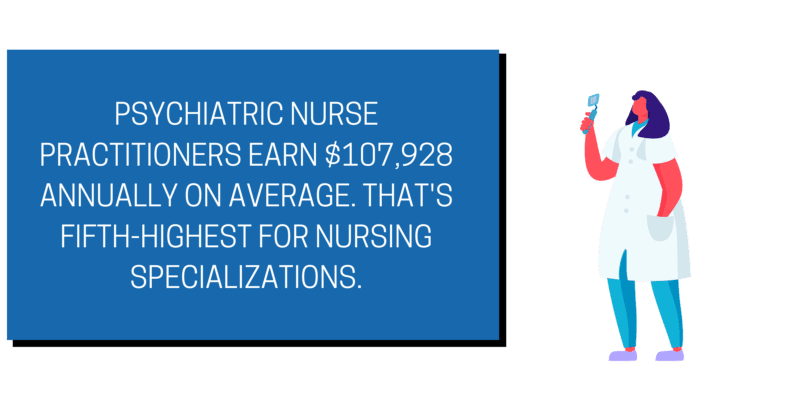
The states with the highest employment for these roles were as follows:
- New York, with 13,710 nurse practitioners.
- California, with 13,420 nurse practitioners.
- Texas, with 12,020 nurse practitioners.
- Florida, with 10,590 nurse practitioners.
- Ohio, with 7,510 nurse practitioners.
The states with the highest pay for nurse practitioners were:
- California, with an hourly mean wage of $64.32 and annual mean wage of $133,780.
- Alaska, hourly mean wage of $59.08, annual mean wage of $122,880.
- Massachusetts, hourly mean wage of $59,01, annual mean wage of $122,740.
- New Jersey, hourly mean wage of $58,70, annual mean wage of $122,100.
- New York, hourly mean wage of $58.16, annual mean wage of $120,970.
We hope you’ve found this guide informative, expansive, clarifying, and assistive. Nursing is a challenging but stimulating, rewarding career that provides utility for others, and incredible fulfillment for working nurses.
Remember, reaching out to programs you’re interested in will go a long way towards helping you get accepted to them, and inevitably reach your goals in nursing or medicine.
Please check Best Health Degrees frequently to find updated content, new answers to common questions, more guides like this one, among other resources.
We wish you the best of luck in your nursing education and career! Now get after it!